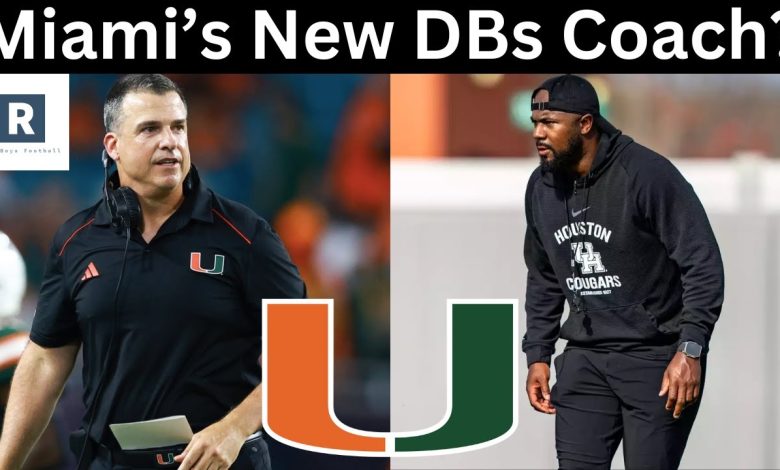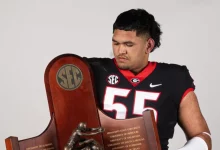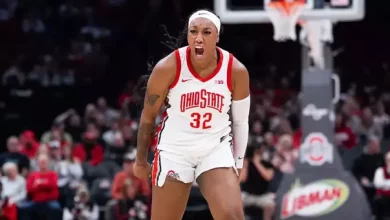Miami Hurricanes football hit with a “Dodgers or Yankees” backhanded compliment from rival coach, sparking debate over recruiting power.

In a combustible dose of rivalry, an unnamed coach in college football recently likened the Miami Hurricanes to the “Dodgers or Yankees”—a comment dripping with both respect and slight. This backhanded compliment underscores the program’s elite brand power while hinting at resentment over their perceived recruiting leverage. The remark has ignited discussions nationwide about Miami’s place in the college football recruiting hierarchy, raising questions about equity, strategy, and how prestige shapes perceptions both on and off the field.
The Comparison: What It Meant
Calling Miami akin to the Dodgers or Yankees isn’t accidental. These MLB franchises are synonymous with winning, high payrolls, and enormous media attention—yet they also draw criticism for their spending, success-by-recruiting quirks, and perceived arrogance. By equating Miami to these baseball giants, the anonymous coach framed the Hurricanes as a program with undeniable appeal and dominance—but also one that triggers envy among peers.
Why the Remark Resonates
1. Brand Power Matters
Like the Yankees’ storied history and the Dodgers’ star-studded talent pipelines, Miami possesses global name recognition. Its legacy in the 1980s and ’90s, championship pedigree, and colorful pageantry (like the Turnover Chain) make it an aspirational destination for recruits.
That brand power leads many to assume Miami holds an outsized edge, both mentally and materially. The remark distills that into a vivid metaphor: the Hurricanes aren’t just another contender; they’re a cultural behemoth.
2. Spending Isn’t Going Unnoticed
The Dodgers and Yankees are infamous for elite payrolls that tilt competition; many rivals accuse them of buying success. For Miami, the parallel lies not in direct purchasing but investment—state-of-the-art facilities, high-paying coaches, national marketing, and NIL opportunities. This flow of resources can create imbalances in recruiting, especially where wealthy programs don’t rely solely on institutional finances to attract talent.
The coach’s comment highlights how Miami’s spending mindset perpetuates both admiration and resentment within the coaching community.
3. Recruiting as the Battleground
Comparisons to superstar clubs evoke a critical truth: in college football, recruiting defines success. A strong recruiting class can reset expectations overnight. Miami’s ability to land elite recruits consistently—and flip them despite competition—mirrors the Yankees’ modus operandi in free agency or the Dodgers in talent development.
The comment aims at this core reality: Miami buys prestige with every commitment, much like those MLB titans.
Broken Silence and Backlash
Though anonymously delivered, the “Dodgers/Yankees” tag didn’t stay secret long within coaching bridges and message boards. Some praised it as a realistic assessment; others felt it downplayed the way Miami builds programs—through player relationships, offensive identity, and community engagement.
Yet supporters argue that even the comparison was flattering. After all, nobody objects to being likened to the best. The broader question remains: does this label fundamentally limit Miami—or validate its approach as modern elite college football?
How Miami’s Program Matches the Metaphor
To judge the comparison fairly, let’s look at the ways Miami resembles—or differs from—those iconic MLB franchises:
Talent and Depth
Miami’s recruiting rankings have consistently hovered in the top 10 nationally. They land elite athletes at quarterback, receiver, and defense. Like Los Angeles or Bronx powerhouses, their roster brims with multi-sport, multi-dimensional players.
NIL and Exposure
Miami athletes benefit from vast NIL deals and visibility in South Florida’s media ecosystem—echoing the financial muscle and branding clout of Yankees and Dodgers.
Program Ups and Downs
Unlike the MLB model, college football fortunes fluctuate with coaching and cyclical recruiting. Miami’s inconsistency over the past decade—though on the upswing—sets it apart from the sustained success expected of elite baseball franchises.
Culture and Identity
Miami bleeds swagger, flair, and an unapologetic identity—just as the Yankees embody tradition and prestige. This cultural edge matters in recruiting rooms where image wars unfold daily.
Reactions Inside the Program
While the coach spoke anonymously, Miami insiders weren’t silent. One staffer remarked, “If comparison to greatness fuels criticism, we’ll take it every day.” Another added, “These are the conversations you want your competition having—it means you’re big enough to carry it.”
Their tone wasn’t defensive—it was defiant, leaning into perception as a superpower rather than a vulnerability.
The Rival Coach’s Strategic Jab?
It’s possible the remark was more than a quip—it may be recruiting play. By airing the envy, it frames Miami as the Goliath everyone’s trying to topple. Framing them as both revered and resented could motivate recruits who want the challenge, not the easy ride.
Other programs may replicate the tactic—not necessarily to shade Miami morally, but to highlight the different path they offer: beat the big dog on equal footing, rather than chase the brand.
Broader Lessons for College Football
1. Brand vs. Substance
College football is a brand war. Strong institutional identity, NIL infrastructure, media presence—all these shape perception. Miami’s “Dodgers/Yankees” tag signals that identity matters, even more than championships.
2. Recruiting Wars are Cultural
Top recruits buy into storylines—iconic, rugged, dominant. Metro markets like Miami offer immense perks, but as the remark suggests, they also carry scrutiny.
3. Pressure of Perception
The bigger you are, the harder you fall—or so the saying goes. Miami must navigate brand expectations and face constant comparative benchmarks, much like their MLB counterparts.
What the Future Holds
As Miami continues to rebuild under its current coaching regime, the “Dodgers/Yankees” narrative may define external pressure more than internal direction. Will they build dynasty-level consistency—even overshadow those giants? Or will each stumble fuel more jabs?
Either way, the remark underscores rivalry reality: Miami isn’t just playing for wins—they’re playing for legacy.
The anonymous coach’s comparison of Miami to the Dodgers or Yankees is more than a throwaway line—it distills complex emotions: respect, envy, criticism. It captures what some see in modern college football powerhouses—a blend of dominance, resources, and swagger.
For Miami, embracing this perception—while strengthening continuity on the field—may turn backhanded compliments into badges of modern greatness. But success won’t come by brand alone; it will come by winning, uninterrupted.









